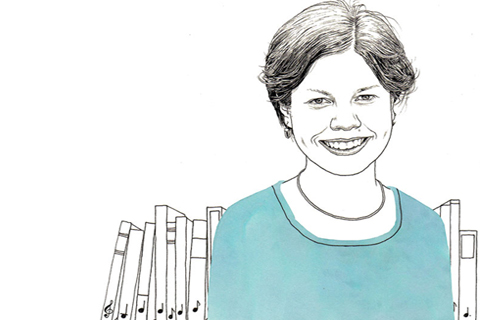As an undergrad at St. Olaf College in Minnesota, Katherine Larson was an accomplished soprano working on a degree in vocal performance and earning a BA in English and women’s studies. With grad school looming, she hit a fork in the road: should she further her training in singing, or pursue her love of literature? Then, she won a Rhodes scholarship to study English at Oxford and realized academia was the right fit.
Larson is now a professor of English at U of T who specializes in 16th- and 17th-century literature and culture – and she brings her love of music into the fold of her academic work.
Larson is currently writing a book about music and song performance in the literature and culture of early modern England. Song performance is a relatively new area of study in literature, and Larson considers all elements of it – why the writer turns to song at particular moments, and the visual and acoustic impact of the physical body during performance. She also considers the relationship between music and gender. Singing contained an inherent conflict at that time: while it was emphasized as a part of a genteel upbringing and was a popular form of recreation for both men and women, in performance song was often associated with sensuality and seduction.
Larson’s first book, Early Modern Women in Conversation, explores how women writers in 16th- and 17th-century England experimented with language and conversation in their work. At the time, the ideal of the woman was to be silent: opening her body symbolically, verbally or through writing, threatened her virtuous reputation. Larson’s book shows that despite this stereotype, women used their writing to test out the kinds of authoritative voices that men used.
Larson relates her research to today’s online environment, where textual conversation becomes a stand-in for oral communication. She notes that modern technology, like women’s writing from the past, allows the marginalized to communicate, and lets people experiment with different conversational codes (think of teenagers using text shorthand) and create fantasy spaces where they take on different identities. And while some argue that we’re losing the ability to converse as we hide behind our computer screens, she says this isn’t so. “If you think of conversation as fundamentally engaging in relationship through language, conversation is alive and well,” says Larson, who is associate chair of the department of English at U of T Scarborough.
In the future, Larson hopes to build on her award-winning research into song performance: she wants to create a collaborative online project in which people can access bibliographies, watch video clips of performances, and collaborate with literary scholars, musicologists and singers – “so that people are engaged in discussions about what it means to bring early music to life.”






